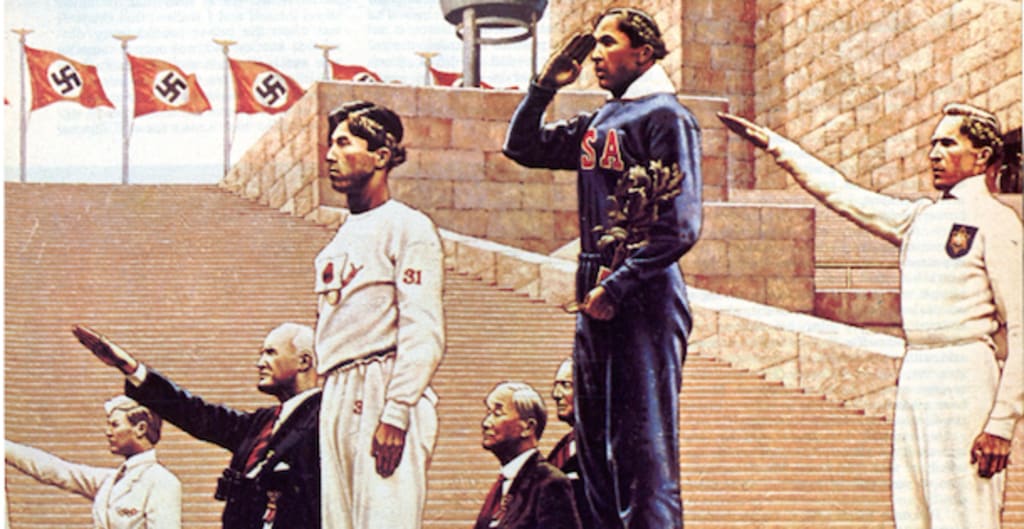Jesse Owens
A man who stood tall in a land of barbarism

James Cleveland "Jesse" Owens (September 12, 1913 – March 31, 1980) was an American track and field athlete who won four gold medals at the 1936 Olympic Games.
Owens specialized in the sprints and the long jump and was recognized in his lifetime as "perhaps the greatest and most famous athlete in track and field history". He set three world records and tied another, all in less than an hour, at the 1935 Big Ten track meet in Ann Arbor, Michigan—a feat that has never been equaled and has been called "the greatest 45 minutes ever in sport".
He achieved international fame at the 1936 Summer Olympics in Berlin, Germany, by winning four gold medals: 100 meters, long jump, 200 meters, and 4 × 100-meter relay. He was the most successful athlete at the Games and, as a black American man, was credited with "single-handedly crushing Hitler's myth of Aryan supremacy", though Owens commented that he was "snubbed" by the U.S. president, Franklin D. Roosevelt, as he was not invited to the White House to shake Roosevelt's hand.
The Jesse Owens Award is USA Track and Field's highest accolade for the year's best track and field athlete. Owens was ranked by ESPN as the sixth greatest North American athlete of the 20th century and the highest-ranked in his sport. In 1999, he was on the six-man short-list for the BBC's Sports Personality of the Century.25 May 1935 is remembered as the day when Jesse Owens established 4 world records in athletics. Owens achieved track and field immortality in a span of 45 minutes on May 25, 1935, during the Big Ten meet at Ferry Field in Ann Arbor, Michigan, where he set three world records and tied a fourth. He equaled the world record for the 100-yard dash (9.4 seconds) (not to be confused with the 100-meter dash), and set world records in the long jump (26 feet 8+1⁄4 inches or 8.13 metres, a world record that would last for 25 years); 220 yards (201.2 m) sprint (20.3 seconds); and 220-yard low hurdles (22.6 seconds, becoming the first to break 23 seconds). Both 220 yard records may also have beaten the metric records for 200 meters (flat and hurdles), which would count as two additional world records from the same performances. In 2005, University of Central Florida professor of sports history Richard C. Crepeau chose these wins on one day as the most impressive athletic achievement since 1850.On December 4, 1935, NAACP Secretary Walter Francis White wrote a letter to Owens but never sent it.[17] He was trying to dissuade Owens from taking part in the 1936 Summer Olympics in Nazi Germany, arguing that an African American should not promote a racist regime after what his race had suffered at the hands of white racists in his own country. In the months prior to the Games, a movement gained momentum in favor of a boycott. Owens was convinced by the NAACP to declare: "If there are minorities in Germany who are being discriminated against, the United States should withdraw from the 1936 Olympics". Yet he and others eventually took part after Avery Brundage, president of the American Olympic Committee branded them "un-American agitators".
In 1936, Owens and his United States teammates sailed on the SS Manhattan and arrived in Germany to compete at the Summer Olympics in Berlin. According to fellow American sprinter James LuValle, who won the bronze in the 400 meters, Owens arrived at the new Olympic stadium to a throng of fans, many of them young girls yelling "Wo ist Jesse? Wo ist Jesse?" ("Where is Jesse? Where is Jesse?"). Just before the competitions, founder of Adidas athletic shoe company Adi Dassler visited Owens in the Olympic village and persuaded Owens to wear Gebrüder Dassler Schuhfabrik shoes; this was the first sponsorship for a male African American athlete.
On August 3, Owens won the 100 m dash with a time of 10.3 seconds, defeating a teammate and a college friend Ralph Metcalfe by a tenth of a second and defeating Tinus Osendarp of the Netherlands by two tenths of a second. On August 4, he won the long jump with a leap of 8.06 metres (26 ft 5 in) (3¼ inches short of his own world record). He later credited this achievement to the technical advice that he received from Luz Long, the German competitor whom he defeated. On August 5, he won the 200 m sprint with a time of 20.7 seconds, defeating teammate Mack Robinson (the older brother of Jackie Robinson).
On August 9, Owens won his fourth gold medal in the 4 × 100 m sprint relay when head coach Lawson Robertson replaced Jewish-American sprinters Marty Glickman and Sam Stoller with Owens and Ralph Metcalfe,[22] who teamed with Frank Wykoff and Foy Draper to set a world record of 39.8 seconds in the event. Owens had initially protested the last-minute switch, but assistant coach Dean Cromwell said to him, "You'll do as you are told." Owens's record-breaking performance of four gold medals was not equaled until Carl Lewis won gold medals in the same events at the 1984 Summer Olympics in Los Angeles. Owens had set the world record in the long jump with a leap of 8.13 m (26 ft 8 in) in 1935, the year before the Berlin Olympics, and this record stood for 25 years until it was broken in 1960 by countryman Ralph Boston. Coincidentally, Owens was a spectator at the 1960 Summer Olympics in Rome when Boston took the gold medal in the long jump.
The long-jump victory is documented, along with many other 1936 events, in the 1938 film Olympia by Leni Riefenstahl. On August 1, 1936, Nazi Germany's leader Adolf Hitler shook hands with the German victors only and then left the stadium. International Olympic Committee president Henri de Baillet-Latour insisted that Hitler greet every medalist or none at all. Hitler opted for the latter and skipped all further medal presentations.
Owens first competed on Day 2 (August 2), running in the first (10:30 a.m.) and second (3:00 p.m.) qualifying rounds for the 100 meters final; he equaled the Olympic and world record in the first race and broke them in the second race, but the new time was not recognized, because it was wind-assisted. Later the same day, Owens's African-American team-mate Cornelius Johnson won gold in the high jump final (which began at 5:00 p.m.) with a new Olympic record of 2.03 meters. Hitler did not publicly congratulate any of the medal winners this time; even so, the communist New York City newspaper the Daily Worker claimed Hitler received all the track winners except Johnson and left the stadium as a "deliberate snub" after watching Johnson's winning jump. Hitler was subsequently accused of failing to acknowledge Owens (who won gold medals on August 3, 4 (two), and 9) or shake his hand. Owens responded to these claims at the time: Owens's success at the games caused consternation for Hitler, who was using them to show the world a resurgent Nazi Germany. He and other government officials had hoped that German athletes would dominate the games. Nazi minister Albert Speer wrote that Hitler "was highly annoyed by the series of triumphs by the marvelous colored American runner, Jesse Owens. People whose antecedents came from the jungle were primitive, Hitler said with a shrug; their physiques were stronger than those of civilized whites and hence should be excluded from future games."
In Germany, Owens had been allowed to travel with and stay in the same hotels as whites, at a time when African Americans in many parts of the United States had to stay in segregated hotels that accommodated only blacks. When Owens returned to the United States, he was greeted in New York City by Mayor Fiorello LaGuardia. During a Manhattan ticker-tape parade in his honor along Broadway's Canyon of Heroes, someone handed Owens a paper bag. Owens paid it little mind until the parade concluded. When he opened it up, he found that the bag contained $10,000 in cash. Owens's wife Ruth later said: "And he [Owens] didn't know who was good enough to do a thing like that. And with all the excitement around, he didn't pick it up right away. He didn't pick it up until he got ready to get out of the car".
After the parade, Owens was not permitted to enter through the main doors of the Waldorf Astoria New York and instead forced to travel up to the reception honoring him in a freight elevator. President Franklin D. Roosevelt (FDR) never invited Jesse Owens to the White House following his triumphs at the Olympic Games. When the Democrats bid for his support, Owens rejected those overtures: as a staunch Republican, he endorsed Alf Landon, Roosevelt's Republican opponent in the 1936 presidential race.
Owens joined the Republican Party after returning from Europe and was paid to campaign for African American votes for the Republican presidential nominee Alf Landon in the 1936 presidential election.
Jesse Owens refused to do the Nazi salute instead he stood for his principals and saluted the American flag.
About the Creator
Lawrence Edward Hinchee
I am a new author. I wrote my memoir Silent Cries and it is available on Amazon.com. I am new to writing and most of my writing has been for academia. I possess an MBA from Regis University in Denver, CO. I reside in Roanoke, VA.






Comments
There are no comments for this story
Be the first to respond and start the conversation.